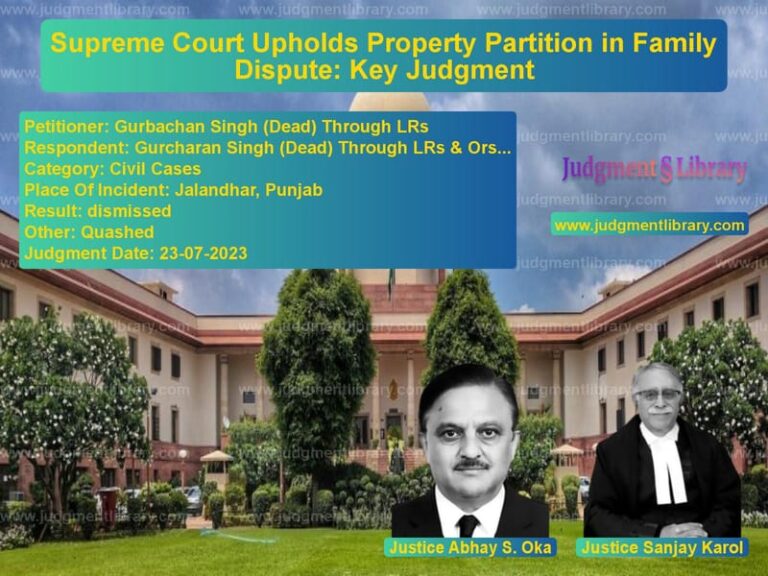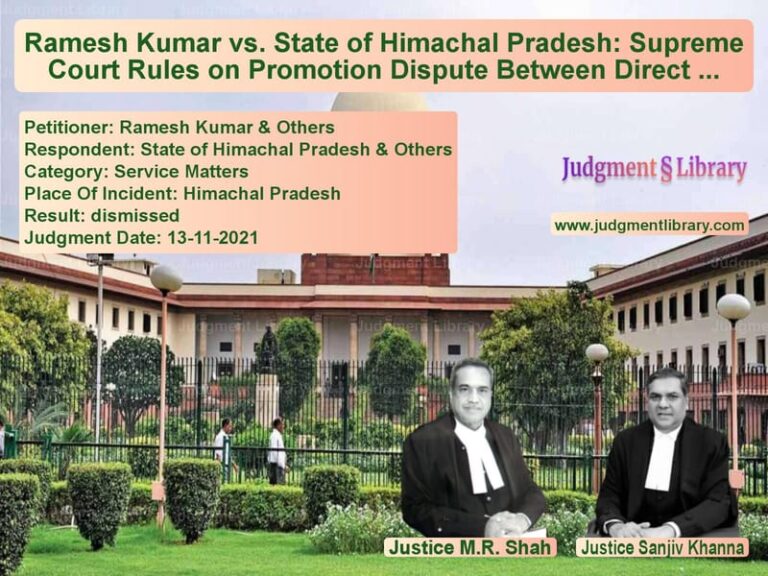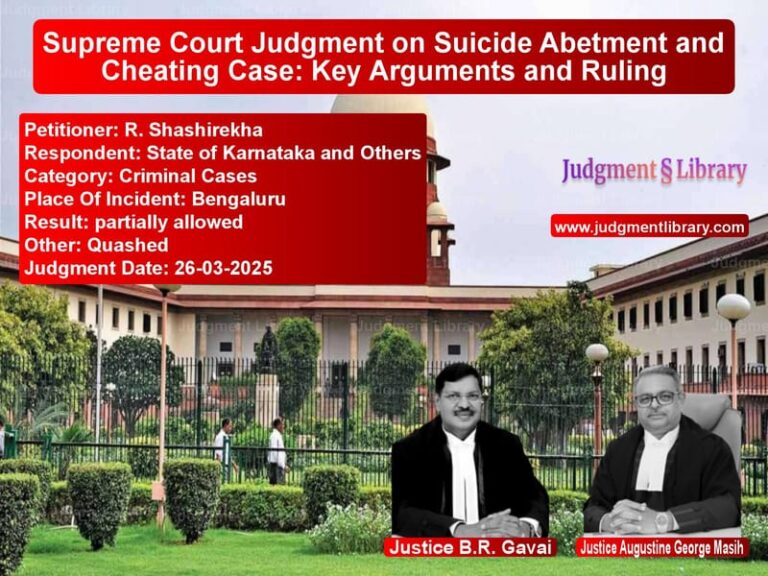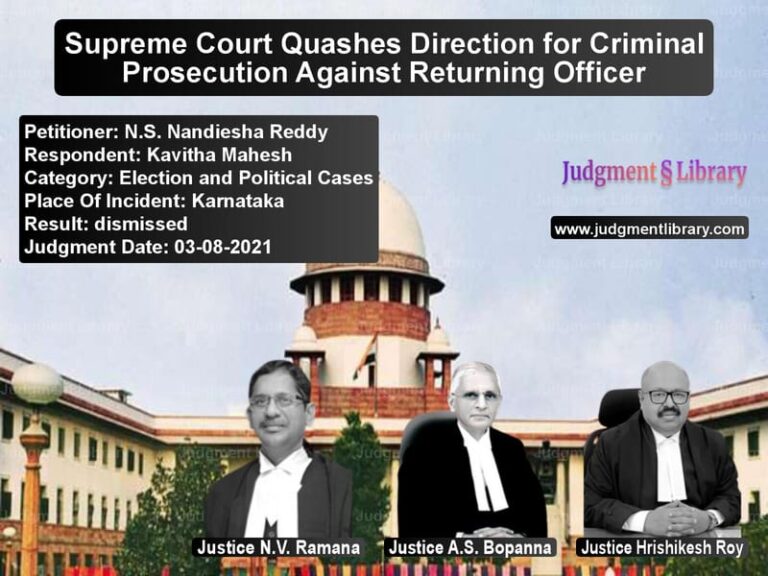BSES Rajdhani Power Ltd. v. Delhi Electricity Regulatory Commission – A Legal Analysis on Tariff Determination and ‘Truing Up’ Process
The case between BSES Rajdhani Power Ltd. (BSES Rajdhani) and Delhi Electricity Regulatory Commission (DERC) involves a significant legal battle regarding tariff determination for electricity distribution. This case revolves around several issues related to the computation of Aggregate Technical and Commercial (AT&C) losses, depreciation calculations, and the disallowance of certain expenses in the tariff determination process. The appellants, BSES Rajdhani and BSES Yamuna Power Ltd., had appealed against the findings of the Appellate Tribunal for Electricity (APTEL), challenging various aspects of the tariff order passed by the DERC.
The main contention in this case lies in the tariff determination process, including the ‘truing up’ exercise which was carried out by the DERC to rectify discrepancies in previous tariff orders. This process, which is meant to adjust discrepancies between projected and actual costs, became a point of contention as the appellants argued that the DERC had made unjustified changes to the methodology used in determining the tariff. The appellants claimed that the DERC was not following its own regulations and guidelines, which led to an unfair tariff determination, affecting their financial stability.
In this blog, we will delve into the Supreme Court’s judgment, which resolved these legal issues and highlighted the principles governing the tariff determination and truing-up processes for electricity distribution in India. The Court addressed the arguments of both parties, the Appellants, and the Respondent, DERC, and provided a final ruling that impacts the electricity regulation framework in India.
The Supreme Court’s bench, comprising Justices S. Abdul Nazeer and Krishna Murari, carefully analyzed the findings of the APTEL and DERC to determine whether the tariff order was just and whether the ‘truing up’ process was conducted in accordance with legal provisions.
Petitioner and Respondent Arguments
Petitioner’s Arguments:
- The appellants, BSES Rajdhani and BSES Yamuna, argued that the tariff determined by the DERC was insufficient to meet their actual power purchase costs, leading to a significant revenue gap. They contended that the DERC failed to allow periodic tariff increases despite regulatory provisions and advice, forcing them into debt to meet operational expenses.
- They also challenged specific findings by the APTEL, including the change in methodology for computing AT&C losses and depreciation, the disallowance of salary expenses for certain employees, and the interest accrued on consumer security deposits.
- The appellants argued that the ‘truing up’ exercise conducted by DERC was unlawful, as it involved changing the basic principles and methodologies used in the original tariff determination, essentially altering the ‘rules of the game’ after the process had begun.
Respondent’s Arguments (DERC):
- DERC, on the other hand, defended its tariff determination and the ‘truing up’ process, claiming that the adjustments made were necessary for maintaining fairness and efficiency in the system.
- It was submitted that the changes made during the ‘truing up’ process were in accordance with regulatory requirements and aimed at correcting any discrepancies between the projected and actual costs incurred by the Discoms.
- DERC further argued that the appellants had not demonstrated the existence of any substantial question of law required for the appeal to be heard by the Supreme Court.
Key Issues and Supreme Court’s Ruling
The case raised several key issues that were examined by the Supreme Court:
1. Change in Methodology for Computing AT&C Losses
The Supreme Court addressed whether the DERC could change the methodology for calculating AT&C losses after the initial tariff order had been issued. The appellants argued that such a change violated the established rules and regulations. The Court held that changes in methodology during the ‘truing up’ process were not permissible as they could not alter the basis of the original tariff order.
2. Change in Methodology for Depreciation Calculation
Another issue raised was the change in the methodology for calculating depreciation. The appellants contended that the DERC had wrongly altered the depreciation calculations in the truing-up process. The Court agreed with the appellants, ruling that depreciation should have been computed using the methodology initially adopted in the tariff order.
3. Disallowance of Salary for Fundamental Rules and Supplementary Rules (FR/SR) Employees
The Court considered whether the salary expenses of FR/SR employees could be disallowed by DERC during the truing-up process. The appellants argued that these salaries were legitimate expenses that should have been allowed. The Court ruled in favor of the appellants, stating that such disallowance was unjustified and contrary to the principles governing tariff determination.
4. Disallowance of Interest on Consumer Security Deposit
The appellants also challenged the disallowance of interest accrued on consumer security deposits retained by Delhi Power Corporation Limited (DPCL). The Court ruled that the appellants were entitled to recover interest on these deposits, as the DERC’s order to disallow such interest was flawed.
5. Reduction in Million Units for Enforcement Sale
Lastly, the Court addressed the reduction in million units related to enforcement sales for the purpose of calculating AT&C losses. The appellants argued that the DERC’s decision to reduce the units was incorrect. The Court sided with the appellants, stating that enforcement sales should be considered in their entirety as assessed energy is deemed to have been supplied.
Conclusion and Impact
The Supreme Court’s judgment in this case has far-reaching implications for the electricity distribution sector in India. It reaffirms the importance of following statutory regulations and guidelines in tariff determination and the truing-up process. The ruling also emphasizes that regulatory bodies like DERC cannot alter fundamental methodologies during the tariff determination process, as such changes may harm the interests of the parties involved.
This case sets a precedent for future tariff determinations and truing-up exercises, ensuring that regulatory bodies act in a fair and transparent manner while balancing the interests of both service providers and consumers. It highlights the need for a clear, consistent approach to tariff determination that ensures the financial health of distribution companies while safeguarding consumer interests.
Petitioner Name: BSES Rajdhani Power Ltd..Respondent Name: Delhi Electricity Regulatory Commission.Judgment By: Justice S. Abdul Nazeer, Justice Krishna Murari.Place Of Incident: New Delhi.Judgment Date: 18-10-2022.
Don’t miss out on the full details! Download the complete judgment in PDF format below and gain valuable insights instantly!
Download Judgment: bses-rajdhani-power-vs-delhi-electricity-re-supreme-court-of-india-judgment-dated-18-10-2022.pdf
Directly Download Judgment: Directly download this Judgment
See all petitions in Income Tax Disputes
See all petitions in Banking Regulations
See all petitions in Tax Refund Disputes
See all petitions in GST Law
See all petitions in Judgment by S. Abdul Nazeer
See all petitions in Judgment by Krishna Murari
See all petitions in allowed
See all petitions in supreme court of India judgments October 2022
See all petitions in 2022 judgments
See all posts in Taxation and Financial Cases Category
See all allowed petitions in Taxation and Financial Cases Category
See all Dismissed petitions in Taxation and Financial Cases Category
See all partially allowed petitions in Taxation and Financial Cases Category







